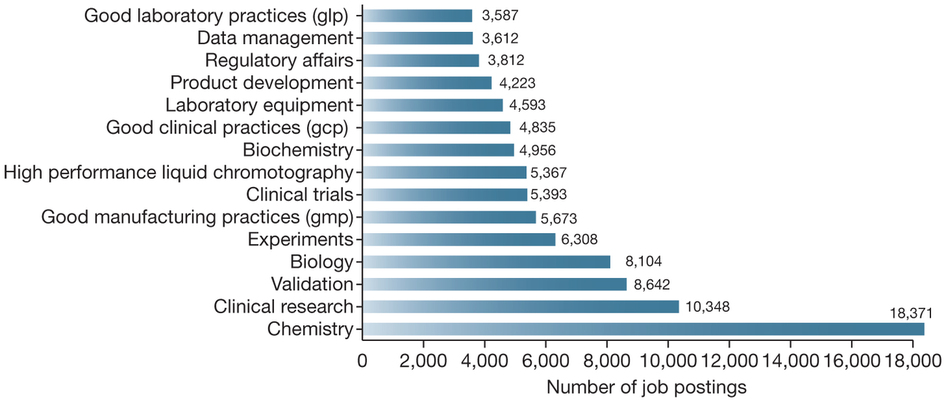Biotechnology, as is the case with many fields today, is becoming increasingly interdisciplinary. Once requiring a specific set of specialized skills, the industry trends now show that individuals with interdisciplinary training are favored. A report published in Nature depicts that a large part of job postings not only include specialized subjects like chemistry, but also involve knowledge in validation, data management and good manufacturing practices. Often, it may not be possible for labs to recruit this talent in-house, and so the on-demand market is continuously growing.

A recent Forbes report finds that mid-level R&D talent is notoriously hard to attract, and it is this talent that determines the organisation’s success. The bulk of biotech talent is recruited from big pharma companies. Typically, researchers in pharma companies are rigorously trained, and they have the advantage of time that is often doesn’t exist in biotech firms. This issue is summarized here:
“The short version of the dilemma is this: biotech startups have no margin for error around very tight timelines so can’t really “train” folks in drug discovery, and because of that they rely on bigger companies as the principle source for talent; but, at the same time, bigger firms are cutting back on research hiring and training, in part while offshoring certain science roles to other geographies, and yet are looking “outside” their walls for innovation from biotechs.”
Some of the recruitment problems faced by biotech companies, as outlined here, are:
-Hiring adequately trained and experienced mid-level talent
-Meeting the compensation packages offered for equivalent roles in the pharma industry
-Offering a better level of control to new hires
This talent crisis is not just limited to researchers. Of late, biotech companies have even been attracting Wall Street’s top talent, including investment bankers. There is no doubt about the phenomenal possibilities that biotech holds, and the future it promises. Most of the Wall Street-ers who made the shift did so because of their belief in the industry, because it was an exciting enough prospect for them to be able to leave their previous jobs. Many of them are new to their roles, and are introducing a different range of skills into the industry, and they bring in a wealth of knowledge that is completely free from bias.
Many biotech firms and labs do not have the resources to be able to hire full-time staff for every skill they’re looking for. The on-demand market is growing quickly, with individuals having specific skills being highly valued. According to Bruce Booth, the biotech sector has never in its 35 year history ever needed as many new Board Directors as it will in the coming two years.
“Collaboration between biotechnology companies recommends itself as an important component of the next stage in biotechnology’s evolution. There are three fundamental arguments that suggest this strategy will work: First, no single technology is likely to meet all the drug innovation needs of modern society. Second, no single company or type of company can possibly possess all the answers. Third, the rapid, and sometimes perilous, pace of the changes affecting the economics of biotechnology make the management of these companies more receptive to alternative strategies.”
Collaboration, both among biotech companies, as well as with academia, will indeed solve some of the industry’s problems. Online collaborative platforms also make it easier to access on-demand expertise. Companies that require specialist knowledge can now connect with experts in other countries/institutions who will be able to make a valuable contribution to their growth.
A Thompson Reuters report refers to the link between collaboration and innovation as ‘collabovation’. Indeed, collabovation is the way forward.
Kolabtree helps businesses worldwide hire freelance scientists and industry experts on demand. Our freelancers have helped companies publish research papers, develop products, analyze data, and more. It only takes a minute to tell us what you need done and get quotes from experts for free.

Unlock Corporate Benefits
• Secure Payment Assistance
• Onboarding Support
• Dedicated Account Manager
Sign up with your professional email to avail special advances offered against purchase orders, seamless multi-channel payments, and extended support for agreements.









